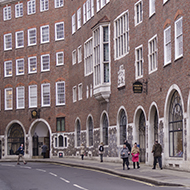European vets gather for FVE General Assembly

Veterinary associations and regulators from across Europe gathered at Church House, Westminster.
The Federation of Veterinarians of Europe (FVE) General Assembly has finally taken place after two years of delays, bringing together delegates from veterinary associations and regulators across the continent.
The event, scheduled for 2020 but postponed due to the pandemic, took place over two days at Church House, Westminster (17-18 June). Hosted by the RCVS and the BVA, the delegation also included the Association of Veterinarians of Ukraine, which gave a moving update on the Russian invasion and its impact on vets and animal welfare.
FVE president Dr Rens van Dobbenburgh and UK chief veterinary officer Dr Christine Middlemiss formally opened the proceedings, after which there were updates on eduacation, veterinary medicines, diversity and inclusion, and the activities of the Animal Welfare Group.
Day one also saw RCVS CEO Lizzie Lockett deliver an update on workforce issues affecting the UK veterinary professions and the College's work on mitigating them. This was followed by an address from the FVE president and Dr Ivo Claassen, head of veterinary medicines at the European Medicines Agency.
FVE’s key divisions and project groups, including the Food Safety and Sustainability Working Group and the One Health Networks, delivered updates on the second day. Guest speakers included talks from BVA President Justine Shotton on ‘Responsible use of parasiticides for cats and dogs,’ and European specialist Fergus Allerton on the European Union’s work to develop sustainable antimicrobial treatment guidelines.
FVE president, Rens van Dobbenburgh, said: “This was our first FVE General Assembly outside Brussels since Covid. The event was extremely well organised by our colleagues from the RCVS and BVA. All of us were impressed by the exquisite locations where we had our meetings, our opening reception and the gala dinner.
“The GA itself was very successful with the adoption of two FVE position papers, namely on animal welfare labelling and transport, and many high-quality presentations on the programme. Last but not least, the event was a perfect mixture of the formal parts together with countless opportunities for networking between European colleagues. Big thanks to our UK colleagues for organising such a splendid event!”



 The Animal and Plant Health Agency (APHA) has updated its online reporting service for dead wild birds.
The Animal and Plant Health Agency (APHA) has updated its online reporting service for dead wild birds.